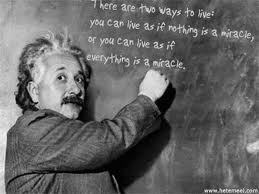
I find it fascinating that, more than 50 years after his death, Einstein is still the name we associate with genius. I’m sure this is partly because no one has disproved his theory of relativity but also because he was a very different kind of scientist to the largely reductionist types we see today. In fact, he thought of himself as religious.
Reading some of his quotes this morning I realise just how much of a spiritual person he was. He believed you could live as if nothing is a miracle or as if everything is. No prizes for guessing which he believed. Here was a man of high intellect who also valued intuition, inspiration and imagination.
He was amazed that, with our limited perspective, we could comprehend any of the world at all and had an “attitude of humility corresponding to the weakness of our intellectual understanding of nature and of our own being”.
He also said: ”Try and penetrate with our limited means the secrets of nature and you will find that… there remains something subtle, intangible and inexplicable. Veneration for this force beyond anything that we can comprehend is my religion. To that extent I am, in point of fact, religious.”
Einstein’s theories are well known and presumably understood – certainly in the scientific and academic worlds – but he also created profound philosophical meditations on the nature of life and reality. This is one of my favourite passages:
“A human being is a part of the whole, called by us ‘Universe’, a part limited in time and space. He experiences himself, his thoughts and feelings as something separated from the rest — a kind of optical delusion of his consciousness.
“This delusion is a kind of prison for us, restricting us to our personal desires and to affection for a few persons nearest to us. Our task must be to free ourselves from this prison by widening our circle of compassion to embrace all living creatures and the whole of nature in its beauty. Nobody is able to achieve this completely, but the striving for such achievement is in itself a part of the liberation and a foundation for inner security.”
It’s sad that half a century later most of us are still in prison, unable to imagine the world beyond the bars of our cells. This takes me back to the haunting fact that neuroscientists are now estimating that we use only one per cent of our brains. It’s no surprise then, that we can’t have a strong grasp of what reality is “out there” because we detect such a small slice of it, rather like fish that will never know they’re in an ocean.
It’s easier perhaps to view the world like Einstein did, with a sense of awe; and to be compassionate to all living creatures, for they know little about their own existence.
Leave a Reply